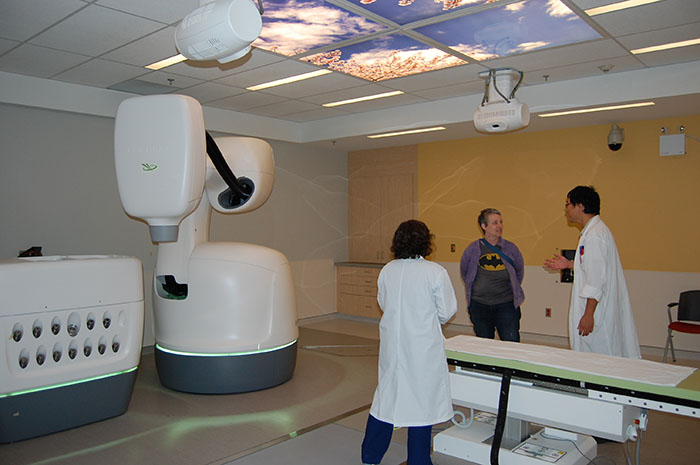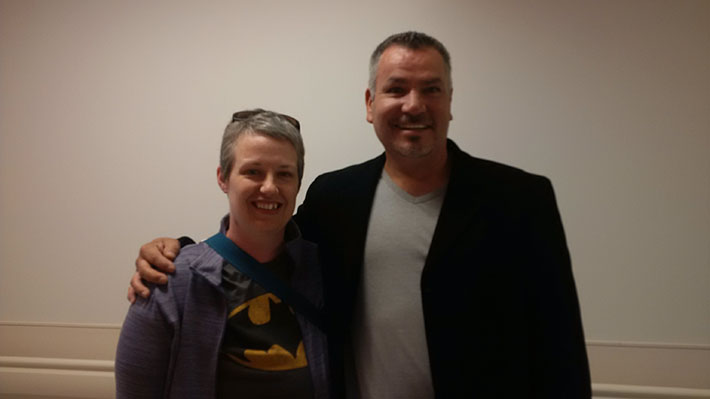MUHC patient receives Canada's first-ever radiosurgery treatment with the CyberKnife® M6
An important milestone was marked on September 21 this year for the Cedars Cancer Centre of the McGill University Health Centre (CCC-MUHC) and for the Canadian field of radiosurgery when the first patient, nation-wide, was treated using a CyberKnife M6 radiation therapy machine.
The CyberKnife M6 is an automated radiosurgery system that is revolutionizing how cancerous and benign tumours are being treated throughout the body. The system moves around the patient while its articulated arms administer a pre-calculated dose of radiation with high precision. As a result, the CyberKnife can be used to treat tumours as small as 0.2 centimetres, typically for patients who have lung, brain, breast, or bone cancers. This level of control, which is not possible with other types of linear accelerators, is expected to improve cancer relapse rates as doctors can be more accurate in targeting tumours during the first round of treatment.

Technicians explaining to Renée how the machine works before her first treatment
The 38-year-old patient, Renée Grandbois, was diagnosed with Inflammatory Breast Cancer on October 1, 2014, seven months after giving birth to her second child. In the last 12 months, she has undergone 16 chemotherapy sessions, a mastectomy, a lumpectomy and 25 radiation therapy treatments at her community hospital in Gatineau, QC. When she and her fiancé Arnold Laford arrived at the CCC-MUHC at the Glen site they received a warm welcome from a mix of radio-oncologists, medical physicists, technologists, and even some McGill radiosurgery alumni who were there to witness the historic event, which involved the treatment of a small 1cm³ tumour that has metastasized to the front right lobe of her brain.
“This process hasn’t been easy, but I have to say that receiving this treatment today has been like sunshine peeking through the clouds,” explained Grandbois. With the 30-minute procedure causing no side effects, including no pain, Grandbois says the entire experience was a huge stress relief compared to other types of treatment she has undergone. “The staff brought me in, took the time to explain every little detail of the procedure and to answer my questions – they even let me pick the music I wanted to listen to!”
“I’ve never felt as reassured as I have been this time,” added her fiancé. “It’s comforting to know that she is receiving top-notch care from both the staff and the equipment. She’s literally being seen by the best of the best.”

Renée Grandbois and her fiancee Arnold Laford
Another important advantage of the machine is the impact it has on patient well-being. The CyberKnife is a non-surgical treatment option that can access hard to reach areas of the body and has little effect on nearby healthy organs and cells. It can carry out treatment in just one to five visits (compared to conventional radiology treatment, which can require as many as 30 visits), greatly reducing the time patients need to spend in hospital.
“This is such an important day for us at the MUHC,” said Dr. Valerie Panet-Raymond, an MUHC radio-oncologist. “Not only are we able to now better treat our patients from across Quebec with the most advanced form of radiosurgery in the country, but we are continuing a rich legacy of radiosurgery at McGill that dates back several decades.”
While Dr. Panet-Raymond recognizes the MUHC’s important contribution to the development of radiosurgery as a discipline, she also considers this to be the next step in our radiosurgery program, both in terms of clinical and research innovations and endeavours.
The road that led to this very first patient was a long one that required the dedication and contribution of many. Thanks goes to those on the Acquisitions Committee, who helped attain this innovative machine, to the teams of medical physicists, technologists, radio-oncologists and more, who spent countless hours on quality assurance, training, and testing to insure patient safety when this day finally arrived.
After having lost over 50 per cent of their family income since Renée’s diagnosis, Arnold has set up a Go Fund Me campaign to help with the overbearing costs of her treatment, insufficient medical insurance, and day-to-day costs in order to provide for their family and two children.
